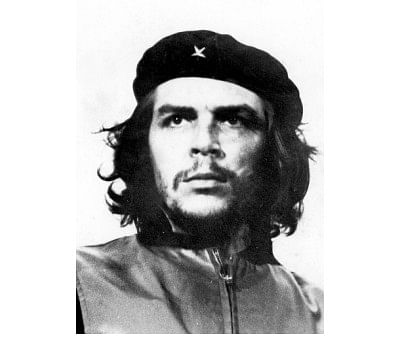Guevara and his dreams

Photo taken by Alberto Korda on 5 March 1960.
The news is not true. Isn't it? Che can't die. Can he?" A nineteen-year-old girl student asked Professor John Jersee when he entered his class at the State College of San Francisco in USA on October 9, 1967. The teacher, editor of Che's Selected Write-ups and an expert on Ernesto Che Guevara, could not believe the news of Che's death like his student. He also did not deliver his pre-scheduled lecture on "Nationalism in Third World and Revolution."
According to him, "It was really surprising that none of us could believe the news of Che's demise right at that moment." The news of Che's death shocked not only Professor Jersee and his class, but also many people all over the world, except some capitalists. It was really tough to accept the news of the sudden demise of the great warrior of the socialist world. Today, on the 44th death anniversary of Che, who spread the waves of socialism in the world of capitalism, I pay my utmost homage to the great soldier of Latin America.
Ernesto Che Guevara was born in Rosario City, Argentina on June 10, 1928. His father Senior Ernesto was a romance-loving person while his mother, who accepted Marxism late in her life, was a daughter of an aristocrat family. Although the philosophy of her last days was not reflected in Che Guevara's early life, it shone brightly in his youth.
He saw and felt the struggles of the proletariat class of society and of his own life as well. He sometimes worked in grape gardens, sometimes as restaurant waiter, or as photographer in the streets of Spain. Che travelled around Latin America on a bi-cycle. He was a medical student in the Buenos Aires Medical University in Argentina.
The great hero of the socialist movement had an outstanding understanding of philosophy, social studies, technology, science and other fields of knowledge. He learnt French from his mother only to read Sigmund Freud. He was a devoted reader of Pablo Neruda's poems. The poetry of Pablo Neruda on the civil war of Spain attracted him deeply. Neruda's poems encouraged Che to enter into the world of literature as a writer and to the path of revolution. He was a multi-faceted, multidimensional and colourful personality.
Che was never a hypothetical daydreamer of Marxism. He explained Marxism in a detailed way. The urban-centric labour-based ideal model of revolution is not imitable in the farming or farmer-based under-developed countries. Mao-Tse-Tung proved that through the laborious experience of conducting the Chinese Revolution. Later on, Ho Chi Minh in Vietnam and Fidel Castro and Che in Cuba were the true followers. This path is the path of rural-oriented, agro-based revolutionary movement.
Steadfast dedication, long-preparation, hard work and strong determination are the pillars of this movement. But, it should be kept in mind too that Che took the path of revolution, policy and theory that differed from the policy, theory and path directed by Mao-Tse-Tung and even Lenin. Indeed, the rebellious life and revolutionary theory of Che comes from the tested struggle and experience of his life.
Today, there is no denying the fact that Che led the protest against the ongoing racism and repression on the poor in the pro-US countries across Latin America. After his success in the Cuban revolution, Che was encouraged to revolt for the freedom of all of Latin America. He left Cuba and settled in Africa's Congo to conduct an open battle in countries outside the Cuba in April 1965. But, he could not become as successful in other Latin countries, including Bolivia, as he was in Cuba.
Che roamed around every nook and corner of the world, crossing the boundaries of Latin America, because of his passion for revolution. Finally, he reached Bolivia again in 1967 and was wounded while leading a guerilla attack against the then autocratic ruler in Bolivia. Later, on October 8, 1967, Ernesto Che Guevara was arrested by the special US-trained Bolivian army. He was brutally killed the next day, October 9, 1967. The bullets killed the warrior of freedom but failed to kill his ideology, hopes and dreams.
In the history of world politics those who, from frustration and angst, killed revolutionaries like Emeliano Zapata, Roza Luxemburg, Leon Trotsky and Ernesto Che Guevara, could not eliminate their the ideologies and beliefs, which have survived for long. The legacy of Che still inspires hundreds of thousands of oppressed and exploited people from Patagonia to Rio Grande.
In the end, I will conclude with a famous quote of Ernesto Che Guevara: "Let me say at the risk of seeming ridiculous that the true revolutionary is guided by great feelings of love."

 For all latest news, follow The Daily Star's Google News channel.
For all latest news, follow The Daily Star's Google News channel. 



Comments